Search intent is the reason behind conducting an online search. It’s the ‘why’ behind search query. Why is a visitor doing a search?
 Everyone who does an online search hopes to find some information about something; how to cook pizza, buy a laptop, best washing machine etc. Search intent is the motive of the journey a searcher undertakes to reach a particular destination. The destination could be buying a product or locating an address of a particular organization.
Everyone who does an online search hopes to find some information about something; how to cook pizza, buy a laptop, best washing machine etc. Search intent is the motive of the journey a searcher undertakes to reach a particular destination. The destination could be buying a product or locating an address of a particular organization.
According to InternetLiveStats, an international team of experts that provide internet space statistics, Google processes 8.5 billion searches per day. To accomplish this feat of monumental proportion and ends up with happy searchers, they must be clinically focused to know exactly what the searcher wants.
They must employ tactics to quickly identify the intentions of the searchers. They must understand the psychology behind every search. Google’s sole objective is to serve the best answers.
Search Term Vs Search Intent
A search term is a word or phrase an online visitor types into a search engine when searching for something (information, product). It could be one word (like Bluehost) or several words such as ‘Best webhost in 2022’. Remember difference in search terms could be as a result of semantic/spelling errors with implications.
 Search intent sometimes can be the same as the search terms. In other instances, it could a subset of the search term or totally opaque. If I type Bluehost in the search engine, I could be having several search intents; hosting a website, comparing BlueHost with another webhost or even joining BlueHost affiliate programme.
Search intent sometimes can be the same as the search terms. In other instances, it could a subset of the search term or totally opaque. If I type Bluehost in the search engine, I could be having several search intents; hosting a website, comparing BlueHost with another webhost or even joining BlueHost affiliate programme.
Search intent is understanding what type of information users are searching for when they enter a search term. Mastering this relationship is the foundation of ranking high in the SERPs. The bottom line is: the type of content you create must match what the searcher is looking for.
Is Identifying Search Intent from Search Terms Really Achievable?
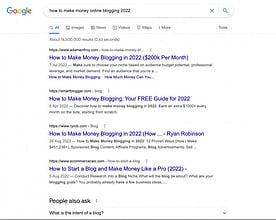
Determining visitors’ search intent is not as simple as the definition. Lets say you search on Google the following three different phrases;
- How to blog and make money in 2022
- Can I make money blogging?
- Monetizing my blog in 2022
The above phrases could be having the same or totally different search intents. How then do you tell who is looking for what? Fortunately, Google has invested heavily on an intelligent algorithm to address this. The algorithm is capable of picking each search phrase and excavate a search intent behind the search query.
Types of Search Intent
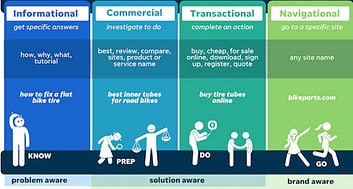 There are four common types of search intent;
There are four common types of search intent;
- Informational Intent
- Navigational Intent
- Transactional Intent
- Commercial Intent
Some quarters argue that there’s another type known as local intent; A search with the intent of finding a nearby location, often conducted on a mobile device
Let’s get into details of each.
1. Informational intent
As the name suggest, informational intent is about people searching for knowledge and information. It could be information on any topic; places, people, technology, religion etc. It often comprises of people looking for;
- Ideas – Affiliate Program
- Definition – Amazon Alexa
- Places – Masai Mara
- Questions – Who is president of USA?
- Guide – How to host a website
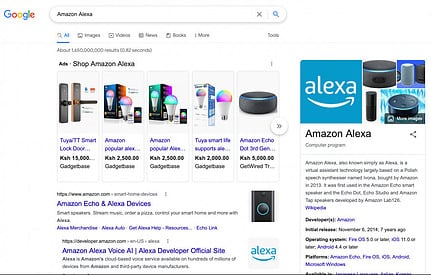 Google’s SERPs for the term ‘Amazon Alexa’
Google’s SERPs for the term ‘Amazon Alexa’
From the above, the results displayed goes beyond the definition of the term. The intelligence of the Google’s algorithm also returns a result of shopping offers, a potential search intent for this word.
As a blogger, content for informational intent audience grants you an opportunity to prove to the Google algorithm that your website is EAT ready (Expertise, Authoritativeness, and Trustworthiness). This greatly enhances your content ranking.
2. Navigational intent
The second type of search intent is called navigational intent. People with this intent want to visit a specific website. For example, people who search for [Facebook] online are usually on their way to the Facebook website. So, you want to make sure that your website can be found when someone searches for your company’s name online.
Navigational intent searchers target a specific website, a web service, or an application. It can also include local searches for public service facility such as National Transport Authority. The searcher intends to navigate to a specific location.
If I want to find the website of Bluehost webhost and I don’t know their URL, a navigational intent search with the term Bluehost will suffice.
Navigational intent examples
- Bluehost
- National Transport & Safety Authority
- Amazon Browser
- Apply for Passport
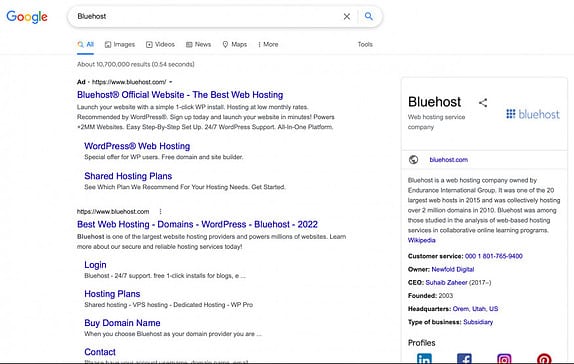 Google’s SERP for the term ‘Bluehost’
Google’s SERP for the term ‘Bluehost’
The biggest beneficiary of navigational intent terms are sites that people must visit for the original content. A student looking for the sole public university funding body will often conduct a navigational search to find their website without any form of enticement.
3. Transactional intent
The backbone of e-commerce is the million customers who buy stuff online. Such customers will browse the web for the best deal that fit their specs and pockets. Such customers have transactional intent with the sole intention is to purchase something. Often, they already know what they want after conducting prior research. The goal is to buy right away.
Transactional intent examples
- Join Wealthy Affiliate
- Buy HP 290 G4 Core i7
- Get Insurance Quotation
- UberEats
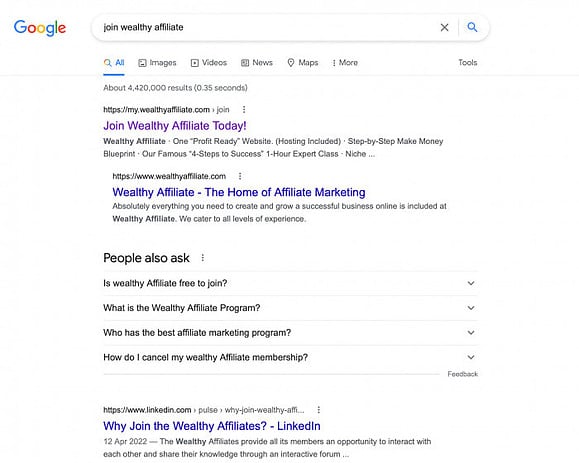 Google’s SERP for the term ‘Join Wealthy Affiliate’
Google’s SERP for the term ‘Join Wealthy Affiliate’
4. Commercial investigation
Commercial intent lies between the informational and transactional intent. The searcher knows and has intention to buy in the near future. However, the decision to buy has not yet been made on specifics (e.g. time and brand). More time and convincing is required for this group of searchers.
Common word/phrases used in commercial queries include top, review, best, good price and comparison.
Examples of queries with commercial intent:
- Safari vs Explorer
- Pretty Links Review
- Best keyword research tool
- Sea Food Restaurants near me
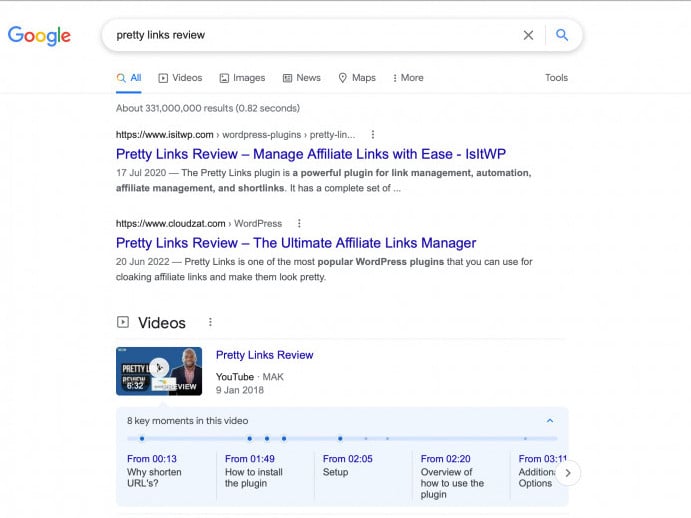
Google’s SERP for the term ‘Pretty Links Review’
Search Intent and Keyword Research
The role of keyword research in SEO campaigns cannot be gainsaid. An article in the Forbes on marketing strategies summarized it this way;
Keyword research provides insights into what questions, phrases and words your target audience is searching on Google. Search intent research takes these findings a step further and explores the main goal your customers have when they’re Googling a topic.
Keyword research tools such as Jaaxy Research Tool help greatly in creating high ranking content. Keywords and search intent compliment each other immensely. For example, search intent can reinforce some aspects of keyword research such as;
- Keyword Evaluation – Often, keywords are evaluated on their on their search volume. The flipside of this is the steep competition that exist for high search volumes keywords. Its therefore not enough to judge a keyword difficulty only on search volume. This is where search intent comes in. As explained above, if you understand the real question about a keyword, you are in pivotal position to successfully judge a keyword difficulty.
- Evaluate Competition – evaluating your competition for a given keyword play an important role in positioning your blog posts. You have to assess several aspects of your post such length, keyword density etc. The norm is usually to compare your content with top competitors. However, this may be misleading to the detriment of your efforts as Google applies different sets of rules for different search intents. Always delve deeper into search intents so that you compare appropriately.
By understanding these different types of search intents together with other keyword metrics like search volume and keywords difficulty, you are in a better position to create the right content. Bloggers must always ensure that the content they create blend search intent and keywords to achieve better rankings.
Search Intent and SEO
The reason search engines such as Google exist is to provide the best answer to search queries – to meet the search intent as closely as possible.
Google employs a group of experts who determine how well its own search results decipher searchers needs. The feedback from these Search Quality Raters (SQR) then help Google to understand the effectiveness of the search results. The SQRs must adhere to Quality Raters Guidelines, a document authored for every SEO segment.
The gist of these guidelines is significance of search intent to Google. For example, you will appreciate the relationships between search intent and attributes such as devices being used by searchers, location or even time zone. In short, the guidelines help you know what Google consider important.
There comes the convergence. If you don’t understand the real question behind a keyword, you are not in a position to create content that successfully meet the needs of your audience. If you don’t understand the search intent, you can as well forget improved rankings in SERP.
SEO is about the right content, format and keywords. Understanding the real question behind a search query is therefore very important in creating spot-on content for your audience.
Why is Search Intent Important in SEO Strategies
It’s not all about pleasing search engines. The underlying goal is to endear yourself to the target audience. Understanding search intent does just that. Your domain will attain high rating and authority and much more;
#1 Build Trust and Credibility
When you position yourself as an authority in interpreting search intents appropriately, your content becomes the darling of the audience. You become trusted as knowledgeable source of relevant information. You will most likely attract more visitors to your website and subsequently attain higher SEO rankings.
Understand Search Intent – Right Content – Trust & Credibility – Happy Audience – High DA – High Rankings
#2 Reduce Bounce Rates
Bounce is one of the Google ranking factors. A visitor leaving your page immediately after accessing it without an action, is obviously an indication of mismatch between your content and search intent. The message is very simple – visitor didn’t find any useful information in your page. Google always penalize that.
Having optimized pages that address the different intents will improve the overall user experience on your website, in addition to helping you rank for more relevant keywords. The trick is to optimize your content for different search intents so as to rank for more relevant keywords.
How to Optimize Content for Search Intent
Search intent is central in having visitors glued to your page. If your content is good quality and comprehensive, they will have no reason to visit other websites.
The foundation of optimizing content for search intent for is relevancy, comprehensiveness and consistency. This involves addressing such aspects as quality, keywords placement, clarity, format and links building. In particular ensure your content adhere to the following;
- Post length – Long posts often are comprehensive and also better addresses specific needs.
- Keywords – strategically placed in the content, URL, metadata and headlines.
- Avoid keywords stuffingHeadings – correctly placed headings an important guide to audience and search engines.
- Links building – include external and internal links for authority and navigational benefits. Avoid overdoing it.
- Anchor Text – remember to always include them. Google use anchor texts to understand relationships in content for clarity
- Images – enhance engagement as well as guide search engines to understand the content. Always include Alt Text for description and search engine indexing. Ensure all images are optimized to improve PageSpeed.
- Always remember to have a CTA (call to action) within your content
No doubt there are many factors that determines the rank, performance and subsquently authority of content on the web. However its the understanding and appropriate application of search/keyword intents in content assembly that makes the difference. Optimizing the content to the search intents, will enable you to create relevant, useful, and authoritative content for your audience.
Jeff
Safari Affiliate
